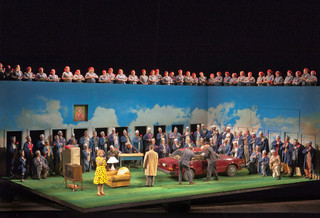|
Back
The Russia We Have Lost New York
The Metropolitan Opera
11/10/2014 - & November 13, 17, 21, 25, 29, 2014
Dmitri Shostakovich: Lady Macbeth of Mtsensk District, opus 29
Eva-Maria Westbroek (Katerina), Anatoli Kotscherga (Boris), Raymond Very (Zinovy), Tyler Duncan (Millhand), Brandon Jovanovich (Sergei), Dustin Lucas (Driver), Holli Harrison (Aksinya), Allan Glassman (Shabby Peasant), Brandon Cedel (Porter), Rod Nelman (Steward), Mikhail Kolelishvili (Priest), Vladimir Ognovenko (Police Sergeant), Earle Patriarco (Policeman), Jon McVeigh (Teacher), Dmitry Belosselskiy (An Old Convict), Richard Bernstein (Prison Guard), Oksana Volkova (Sonyetka), Kelly Cae Hogan (Convict), Paul Corona (Prison Officer)
The Metropolitan Opera Orchestra and Chorus, James Conlon (conductor)
Graham Vick (production), Paul Brown (sets and costumes), Nick Chelton (lighting), Ron Howell (choreographer)

(© Ken Howard)
It seems almost irritatingly de rigueur to begin a discussion of Shostakovich's second and final opera with a reference to its troubled history in Stalin's Soviet Union, where the dictator's visible displeasure at the work's 1936 Moscow premiere led to its condemnation. Enough has been said about that elsewhere. More interesting is the composer's adaptation of Nikolai Leskov's story of warped family intrigue and gratuitous sexual violence. Raped or ravished (depending on the production) by her feckless husband Zinovy's farm worker Sergei, the bored housewife Katerina falls for the rapist/seducer. She then poisons her boorish father-in-law and, helped by Sergei, kills her husband, too. Arrested at their own wedding after the town drunk tips off the police about Sergei's rotting corpse, the devilish couple is exiled to Siberia. On the way Sergei abandons Katerina for the tramp Sonyetka, who surrenders herself to him fully when he manages to appropriate Katerina's last pair of stockings for her. Driven mad by Sergei's betrayal, Katerina drowns herself and Sonyetka as the column of prisoners sullenly trudges on. Alongside these maudlin scenes, the opera's tragic plot is offset by funny satires on Russian provincial life. Its score embraces sharp dissonance to illustrate fractured personalities, frenzied circus-like music to depict extremities of sexuality, grotesques of traditional and popular musical forms to mock the characters, and occasional harmonic passages to develop sympathy for Katerina and her predicaments.
Lady Macbeth returns to the Met for the first time since 2000, exactly 20 years to the day it first entered the company’s repertoire in 1994. Graham Vick's production updates the story from its original setting in the 1860s to a garish late Soviet-era nowhere. Attributes of the sets and costumes suggest both the 1950s and the 1980s. Action in the troubled Izmailov household revolves around an old fashioned television and refrigerator. Zinovy makes his exit and entrance in a boxy little Soviet car. After his murder, he ends up in its trunk. Katerina and Sergei's wedding is dominated by a giant disco ball that casts obnoxious neon colors all over the stage. The police and prisoners are stiff products of stale institutional Soviet officialdom. Instead of the Siberian river in which Katerina drowns Sonyetka, the final scene places the murder-suicide in a ditch where the convicts empty their excrement.
When this production first premiered, it was widely taken as a forceful comment on the dislocation of the troubled post-Soviet Russia then painfully emerging from communism. Twenty years later, with the chaotic edge of 1990s Russia now worn into the staid bludgeoning of Putinism, it looks a bit outdated, more a historical comment on that moment in time than a piece with any contemporary relevance. This is only the second revival since the company premiere, but it is one clear case of a production that should legitimately fall on Peter Gelb's chopping block.
With so much native Russian talent emerging in the post-Soviet world, staging a Russian opera with non-Russian principals could be a potential hazard. Yet in Eva-Maria Westbroek, the Met found a superb Katerina, chilling when she needed to be (which is often) and pensive and lyrical when the drama called for that affect. The study was nothing less than superb, the dramatic highlight being her scream when the orchestra blasts her shock at the full extent of Sergei's betrayal of her with Sonyetka. Along with Brandon Jovanovich's bright and ebullient Sergei, their excellent Russian diction helped the evening along. Anatoli Kotscherga’s Boris anchored this superb principal cast with snarling bass tones. In an opera with many small character roles, it was a special pleasure to see so many fine Russian repertoire singers deployed to maximum effect. Most noteworthy was Vladimir Ognovenko's police sergeant, who barked out his corrupt orders with the authority of Boris Godunov, another role he sings. Dmitri Belosselskiy's old convict captured the character's philosophical song with deep-rooted pathos. The talented mezzo Oksana Volkova made the trashy Sonyetka easy to despise.
James Conlon delivered a solid and technically meticulous performance, though there were patches when the action slowed more than it should have. The most thrilling orchestral moment - in an opera with so many - was the repetitive brassy music of the scene in which Zinovy’s body was discovered. Otherwise the orchestra seemed to focus on the eerier qualities of the piece in a way that passed over much of its excitement.
Paul du Quenoy
|